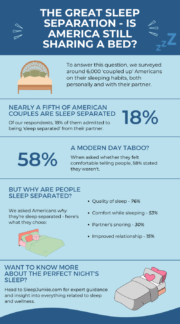Why Does Heat Make You Tired?
When your body is subjected to increased temperatures, it has to work extra hard to maintain a consistent internal temperature. The extra labor of maintaining normal temperatures causes the body to become lethargic. In this article, we will discuss the reasons why body temperature spikes, how you can prevent yourself from overheating, and why heat makes you tired.
How the Body Maintains Temperature
High temperatures cause a body response called vasodilation, which is the dilation of blood vessels. Vasodilation increases blood flow near the skin surface to cool the blood—this is why the skin flushes after body temperatures increase.
Vasodilation also causes the skin to sweat, which cools the skin as it evaporates; however, to do this, heart rate increases, which can stress the body and exhaust you.
Reasons Why Heat Makes Your Sleepy
There are several external factors that make your body temperature spike, such as your environment. The degree of humidity of the air and air circulation plays a role in how much your body temperature rises, and internal factors like heart rate and blood pressure can also cause you to run warm and make you feel tired.
Dehydration
Dehydration is caused by the loss of fluids and salt through sweating—usually leading to tiredness.
Many people spend their lives slightly dehydrated. When the body secretes sweat to decrease internal temperatures, dehydration worsens and may cause fatigue.
In the case of a sunburn, the body diverts fluids to the burn to repair skin damage, causing the body more work. The diversion of fluids from other body parts also prevents sweating and causes overheating.
Low Blood Pressure
Warm temperatures cause your blood pressure (BP) to drop. A slight drop in BP can make you tired because decreased blood flow means less oxygen reaches the brain, causing the body to struggle to perform tasks it normally does easily.
Psychological Links
It’s common for someone to make a connection between a sound, taste, texture, or sight and something else completely unrelated. When you associate a feeling or action with certain conditions—for example, a warm environment with sleeping—you’ll find yourself falling asleep when warm.
“Emotions, like anxiety, can make your body temperature rise and the skin to vasodilate. Although this is generally not long-lasting,” says Dr. Renata Riha of Edinburgh University’s Sleep Research Unit. “Hormonal changes, such as loss of estrogen during menopause, can also play a role,” she adds.
Avoiding Heat Fatigue
There are ways you can help your body maintain a consistent temperature. Follow our tips below to stay comfortable throughout the hot summer months.
Stay in the Shade
While you need vitamin D to stay healthy, it’s best to stick to the shade during hot weather. Too much sun exposure can increase the risk of heat exhaustion, which is a serious condition involving rapid pulse and heavy sweating as your body overheats.
On days you cannot avoid the sun, put sunscreen on to shield your skin from the ultraviolet rays, preventing sunburn. Wear a hat. Increasing air circulation around your body, for example, by using a fan, can also help.
Staying in the shade shouldn’t disrupt your circadian rhythm (the internal clock responsible for keeping a consistent sleep and wake cycle). As long as you go outside several times a day, you shouldn’t feel tired while following a typical day-to-day routine, maintaining a healthy sleep schedule.
Stay Hydrated
If you find yourself becoming tired, drink plenty of water to restore your fluid levels. We recommend room temperature water instead of cold water as lukewarm water absorbs better into the body, helping you cool down faster.
Eat Salty Snakes
Eating a salty snack, such as pretzels, helps your body regulate internal temperature by restoring salt and electrolytes.
Take Breaks
Taking breaks on hot days or when you’re engaged in strenuous physical activities gives your body time to cool down before taking on more tasks.
Cooling Down for Sleep
When the body prepares for sleep, it naturally drops its temperature. Emulating this natural reaction before bedtime can trick your body into increasing melatonin production and make you feel tired.
You can raise your body’s temperature by taking a warm bath or drinking a warm drink. There are also a number of tricks for staying cool when it’s hot, such as freezing or gently misting your sheets.
If you can afford it, you can also consider investing in sheets for hot sleepers and other cooling bedding:
- Best Cooling Mattresses for Hot Sleepers
- Best Cooling Mattress Toppers
- Best Cooling Sheets
- Best Cooling Weighted Blankets
- Best Cooling Pillows
- Best Blankets for Summer
To save on cooling bedding and mattresses, we suggest taking advantage of the year’s big mattress sales:
- Best Presidents Day Mattress Sales
- Best Memorial Day Mattress Sales
- Best 4th of July Mattress Sales
- Best Labor Day Mattress Sales
- Best Black Friday Mattress Sales
- Best Cyber Monday Mattress Sales
Frequently Asked Questions
Why do I feel so tired when it’s hot?
When it’s hot, your body starts sweating to cool down, but this process eats up some of your bodily resources. It may not feel like you’re doing much, but the effort needed to just stay cool costs energy. Drinking plenty of water can ensure you don’t feel too tapped out when you’re out in the heat.
Can the weather make you tired?
Yes, the weather can make you more tired. As we’ve discussed, heat can tire you out simply through your body’s methods of staying cool. Meanwhile, people may feel tired in the winter months because they’re getting less sunlight, which affects their circadian rhythms that regulate their sleep-wake cycle.
Why do I feel lazy in summer?
Fatigue can be tied to dehydration, especially as the body uses energy to sweat and stay cool in the heat. However, it’s not the only reason you might find yourself lazing about in the summer. The longer daylight hours of summer can make it more difficult for people to feel tired and fall asleep at night. So after a poor night’s rest, you might feel tired on a summery day.
How can I cool down at night?
If you find yourself feeling too hot at night, you can follow a few cooling hacks for hot weather. Gently misting your bedding or sticking it in the freezer before bed can help it stay cool in warmer weather. To cool yourself down, you can take a hot bath or shower before bed to trigger your body’s cooling responses.
Is it better to sleep in the heat or cold?
Sleeping in the cold is the better way, though you don’t want to be in a too-cold bedroom. The ideal temperatures for sleep are in the mid-to-high 60s and low 70s, and people may struggle to sleep if it’s much cooler or warmer. If you’re in an area that’s warmer than this, it’s important to take what steps you can to promote cooler sleep.
Conclusion
There are many ways your temperature can spike: dehydration, low blood pressure, as well as psychological and hormonal links. If you take care of yourself by drinking enough water, eating healthy, staying out of the sun on hot days, and taking breaks during physical labor projects, you shouldn’t have to worry about suffering sleepiness at random times.
When it’s time for bed, though, make sure your room is set at the best temperature for sleep so you’ll nod off quickly for a good night’s rest.


